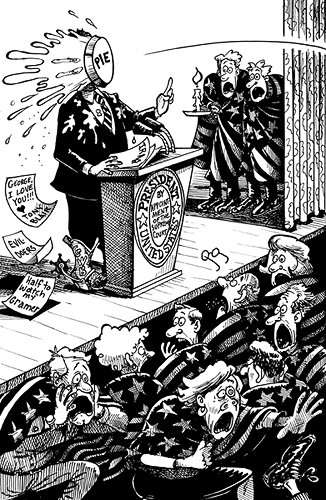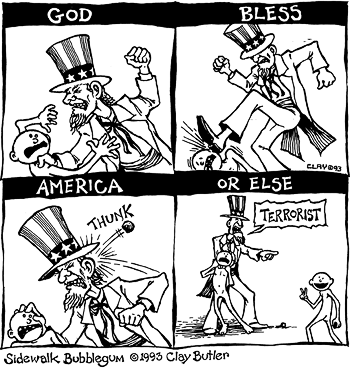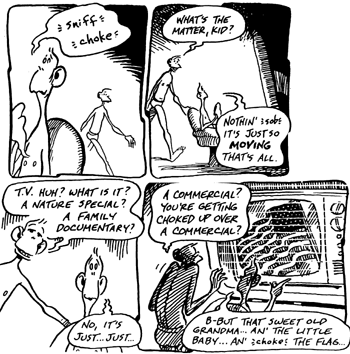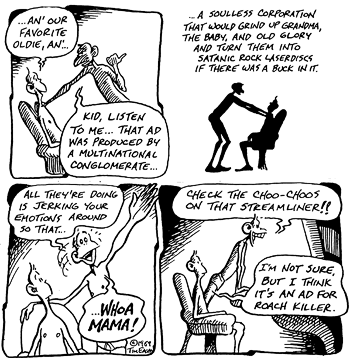![[Metroactive News&Issues]](/gifs/news468.gif)
[ Santa Cruz Week | SantaCruz Home | Archives ]
'When people have no sense of humor, it makes them hysterical to everyone else. The guy that can make fun of himself, there's no reason to bring him down. He's already self-effacing. You talk about the pompous politician ... many of these people can't see the humor, and as a result, they make themselves targets that way, through arrogant self-importance and calling attention to themselves ... But the hard part [of cartooning] isn't the subject matter and it isn't the opinion, because I always know how I feel about that subject right away. The difficult part is the metaphor, finding the means to inject that into a newspaper, in a cartoon. You have one little space to do it in.' --Steven DeCinzo
Pumping Irony
Pundits said Sept. 11 would kill satire, but it only made it stronger. Political cartoonists explain why.
By Mike Connor
INWARDLY STUNNED in the immediate aftermath of the Sept. 11 attacks, media pundits nevertheless scrambled to make sense of the horrific events that had just sent a huge chunk of the world into shivering shell shock. Clearly, nothing would ever be the same again, and Americans needed something to help them get a grip on what was happening. Alas, it seemed no one voice could put an entire nation's shock into perspective.
Finally, however, one single media outlet came through with a hard-hitting issue that would begin the healing process. Indeed, the "Holy Fucking Shit: Attack on America" special report from The Onion may very well go down in history as the finest, most cathartic newswriting ever.
Or not. But the point is that the wildly popular issue had people flocking to the website in droves to read the headlines: "Hijackers Surprised to Find Selves in Hell," "U.S. Vows to Defeat Whoever It Is We're at War With" and the ever-popular "God Angrily Clarifies 'Don't Kill' Rule." As crazy as it may sound, stories like "Not Knowing What Else To Do, Woman Bakes American Flag Cake" gave voice to the profound sense of helplessness many people felt in the wake of the attacks at the same time that it poked fun at patriotism.
The success of this approach was hardly dumb luck. The Onion was just doing what it does best: using humor to help us look at harrowing issues point-blank. Nobody wants to read detailed accounts of marine animals suffering in the wake of an oil spill, for instance, but they might read a story entitled "Oil Spill Improves Viscosity of Baby Seals." Sure, it's an exercise in poor taste, but underneath its slimy satirical coat, the story is an honest look at how horribly these animals suffer. And if tasteless jokes are what it takes to get people to see the truth, well ...
'This is how it's always been. This is foreign policy in a nutshell, it explains everything. So it always feel current, because I make a point to address the fundamental structural realities which don't seem to change. And I would assume that with some of my strips, only a handful of people thought they were really amazing, but depending on what current events were happening, they might jump to people's favorite lists because of the topical issues that come up. In '93 [when I drew that strip] I don't know that everyone would understand it because it would require a certain knowledge of U.S. foreign policy over this century.' --Clay Butler
Ding Dong, Irony Is Dead
But wait, rewind back to the scrambling media pundits, our corporate-elected tribal elders who, through TV and radio pulpits, speak to us in times of crisis. What did they tell us about our fate after 9/11? America has lost its innocence. Irony is dead.
At last, it seemed, we would never have to hear that Alanis Morissette song ever again. But lo, the prophets spoke not of pop songwriters who don't quite understand the definition of irony (we all know by now it's not like rain on your wedding day). Without spending too much time nitpicking about usage of the word "irony" a la Dave Eggers--the literary phenom who defined, possibly trademarked, copyrighted and otherwise shanghaied a perfectly misused noun--let's just say that what we saw was simply a case of mistaken identity, since the pundits in fact meant that satire was dead. Which as we now know is like saying that a vampire is dead, because it never really is. It's undead, and it's eternal. And in order to survive, it must suck the blood of the living boneheads.
One could argue, even, that the right to satirize boneheads is one of our most valuable cultural assets. Political satire is a sacred manifestation of the First Amendment of the Constitution, as well as an invaluable means of cutting issues--and people--down to size. Not an easy task after a tragedy as epic and deeply felt as Sept. 11--even The Onion held back an issue in order to figure out an approach that would tread that fine line between cathartic and infuriating.
On the opposite side of the country, thousands of miles away from ground zero, it wasn't any easier. Local political cartoonist and one-time DA candidate Tim Eagan, whose comic strip Deep Cover runs in the Santa Cruz Comic News, remembers how difficult it was to work in the wake of Sept. 11.
"[After Sept. 11] I was looking for something every week" Eagan says, "and as you know, The Onion took a week off after 9/11, I gather because they weren't feeling funny. But then the very next week, they helped, I thought. Explaining the 'Don't Kill' rule, what could be better? Bottom line, it was about the killing of all those people, and in their article they boiled it down to that, at least for me. It's about "don't kill," for whatever reason. That helped me get a handle on it, perspective."
After Sept. 11, Eagan says, "I just kinda stuck with the dark irony for a while, because I'm comfortable with it, and it started to get funny about a month later with plain old jokes, which may or may not be ironic."
Still, he was mildly disgusted at the time with the tone of the discussion around the supposed death of irony. "I heard some wiseguy interviewed on NPR confusing irony and cynicism," he says. "[Cynicism] is a cheap way of viewing the world that doesn't require thinking, but irony does require thinking, so I don't think it's the same at all. Irony is alive and well, it's just a way of standing things on their head so we can see them better. It's a method of coping, and cynicism is too, but just because they have that in common doesn't make them the same thing."
Clay Butler, whose strip Sidewalk Bubblegum has run in many local publications, including Metro Santa Cruz, as well as outlets as far afield as Hufvudstadsbladet, Finland's largest Swedish-language daily newspaper, calls all the talk about the death of irony "a parody in itself."
"It's sad," he says. "All those impassioned, ill-thought-out statements in themselves were completely predictable, and were borderline parody. Just the statement that 'everything has changed, we will never be the same, and Americans will now become more serious,' that in itself was a completely ridiculous statement. I think that for anyone who had any sort of historical perspective, things just got more ridiculous after Sept. 11."
"It's not the first time that's happened," points out Metro Santa Cruz cartoonist Steven DeCinzo. "You know what killed the Rat Pack in Vegas? The Kennedy assassination. Nobody wanted to laugh anymore. And when anybody tried, it was irreverent, disrespectful. The audience became bleak, they weren't showing up anymore, the jokes weren't there anymore, as if it was time to grow up ... when Sept. 11 hit, I did four cartoons on that event and all of them were killed. I had even done some self-censoring, but nobody wanted to hear anything of it. It was just too close. Six weeks later, the same cartoons ran. Enough time had passed."
When One Cartoon Is Worth 1,000 Words
The political cartoon has successfully affected widespread social/political consciousness ever since the invention of the printing press made words and images readily reproduceable. Nowadays, given the infamously busy lives and much-maligned short attention spans of most Americans--not to mention significant advances in the technology of mechanical reproduction--the political cartoon is particularly relevant today as a marvelously efficient delivery system for your daily dose of satire.
Butler explains the succinct nature of comic-speak: "For a comic strip to work, you need to distill a complex idea down to its essence. That process alone forces you to whittle away all the assumptions and figure out really what is going on. And so my comics are basically political essays in graphic form, but instead of taking 1,200 words, I do it in a handful of words and a drawing."
"It's like a shorthand for issues," says Eagan. "The better ones, anyway."
And of course, "better" is in the eyes of the beholder; the quality of a cartoon is determined by any number of technical aspects, such as the quality of the drawing, composition, content and commentary. Ultimately though, it comes down to two things: How did the cartoon strike you? And, more importantly, was the provocation worthwhile? Provocative cartoons often have a way of putting people in touch with their true feelings about an issue, even if (and sometimes, especially if) a person's views are completely opposite those of the cartoonist.
DeCinzo has been entertaining and pissing off Santa Cruzans for years with his political cartoons in Metro Santa Cruz. His approach is decidedly and infamously aggressive. "Political cartooning is ridicule. It is about the most powerful nonviolent weapon that we have at our disposal," asserts DeCinzo. "Political cartooning can change policy, can change individuals by embarrassing them into a corner, if the cartoon's good enough. If it isn't--if the cartoon isn't clever or witty--then it won't matter. But the power of a cartoon is and always will be to shed light on an individual that hides behind pretentiousness."
'My ideal cartoon for "Deep Cover" is like a minimovie. It has characters, a beginning, middle and an end, and it has a change of course in the middle ... But the main ingredient in satire is some kind of truth. Sometimes, the more distasteful the truth, the better, because you bring it out into the light of day by getting people to laugh at it. There's plenty of false sentiment out there that needs to be pointed to, things that are perhaps too big that have to be brought to their real size ... pompous personalities, overinflated rhetoric.' --Tim Eagan
Glass Houses
But focusing on individuals in a small city like Santa Cruz is invariably a hairy endeavor. "That's the thing about doing local politics," says Eagan, who used to work at now defunct S.C. papers the Independent and Sundaz. "The person you talk about is the guy that lives next door, so if he doesn't like what you're saying, he may throw a rock through your window."
But DeCinzo is unflappable. "I don't have anxiety about lampooning somebody that might live next door to me," he says. "It doesn't bother me that they're local. There's nothing I can do that can make things worse for them. Usually they've done something far worse that has brought them notoriety, and I'm just making commentary on what they've already done."
Butler, on the other hand, eschews sending up locals, choosing instead to pick at the bigger picture. "I think most political cartooning is a waste of time," says Butler. "What I mean by political cartooning is cartoons that focus on the issue of the day, specific politicians, the typical stuff of your mainstream political cartoons. That's because by focusing on a specific politician or event, the underlying assumption is that everything else is fine the way it is, and it's just these people or issues we need to change. Where I feel the people and the politicians are interchangeable, and are actually quite irrelevant to the underlying structural problems."
Whether cartoonists tackle topical or structural issues, the important thing is that they continue performing their function as incisive cultural dissectors and commentators. Even if I disagree with them, I'll tip my hat to anyone who makes me think intelligently about an issue, because as anyone who knows me knows, that ain't no easy task. And, of course, DeCinzo has something to say about that.
"I think that's what comes from watching so much television." DeCinzo says. "I think that's one of the reasons we were so in shock after Sept. 11, because this nation doesn't know how to organize its thoughts anymore, and we tend to just do what everyone else is doing. We wrap ourselves in flags and we light candles. And if the nation is somber and morose, then we think we have to be somber and morose. And we're told things that don't make any sense at all. 'If you care about your country and you want be patriotic, go shopping.' That's sad commentary on a country where, in order to feel like a patriot, you need to go shopping. But nobody questioned it, the media didn't question it. They don't question anything anymore."
Hey, what's that supposed to mean?
Copyright © Metro Publishing Inc. Maintained by Boulevards New Media.
![]()

Illustration by Steven DeCinzo

Illustration by Clay Butler


Illustration by Tim Eagan
Tim Eagan and Clay Butler have both been anthologized in 'Attitude: The New Subversive Political Cartoonists', edited by nationally syndicated cartoonist Ted Rall. Eagan's and Rall's work both appear in the 'Santa Cruz Comic News.' 'I think my strip's retired,' says Butler, enigmatically. Steven DeCinzo is at large at Metro Santa Cruz and considered dangerous.
From the September 11-18, 2002 issue of Metro Santa Cruz.